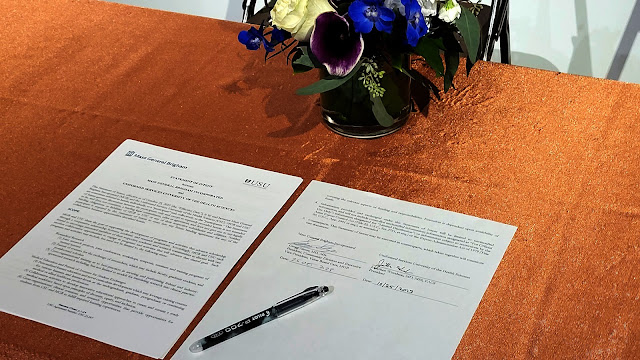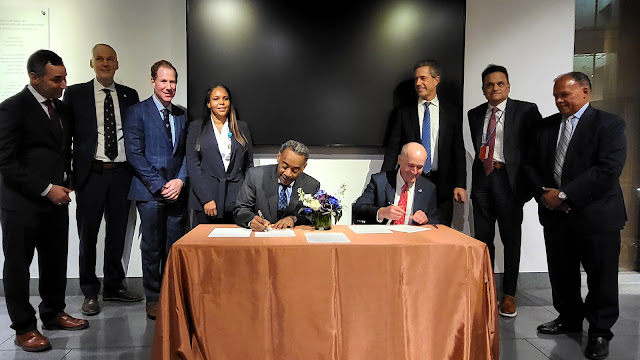Uniformed Services University, Mass General Brigham Sign Statement of Intent for Collaboration in Healthcare Innovations
The Uniformed Services University of the Health Sciences (USU) and Mass General Brigham (MGB) Health System have formalized a partnership to drive advancements in a number of healthcare domains.
October 31, 2023 by Sharon Holland
In a significant stride toward healthcare innovation, the Uniformed Services University of the Health Sciences (USU) and Mass General Brigham (MGB) Health System have formalized a partnership to drive advancements in a number of healthcare domains.
Dr. Jonathan Woodson, president of USU, and Dr. Gregg Meyer, president of Community Division and Executive Vice President of Value-Based Care for MGB Health System, signed a Statement of Intent (SOI) in a ceremony held at the Massachusetts General Hospital Paul Russell Museum in Boston on Oct. 25, 2023. The SOI solidifies the commitment of USU and MGB to work in unison on various critical healthcare initiatives, starting with three key areas: research, education and workforce development. Throughout the day, leaders from MGB and USU convened a series of discussions identifying core collaborative research areas and digital health innovations.
“It’s very clear to me, that given all the complexity of the world, what’s happening in healthcare – but more importantly, what’s happening geopolitically around the world – that working together, the civilian side and the military side, has never been of greater value. And I firmly believe that by working together we have a lot to learn from each other. But there’s something much more important. I actually think that what we’re beginning here tonight, is our chance to not only learn from each other, but learn together,” said Meyer. “We will be able to accelerate the development, validation, testing, and scaling of innovations across both the Military Health System and the civilian health system in a way that could only happen when you bring together two world class institutions – Uniformed Services University and Mass General Brigham.”
 |
USU and the Mass General Brigham Health System formalized a partnership to drive advancements in a number of healthcare domains. (Photo by Sharon Holland, USU) |
Woodson reminded attendees that Mass General Brigham had a deep history tied to the military, so the partnership between USU and MGB was a natural and historic alliance that would undoubtedly yield significant benefits for healthcare and medical advancements.
“The world is on fire right now. In military parlance, we say it’s VUCA – the world is volatile, uncertain, complex and ambiguous. And not only is the world in general that way, but healthcare is also volatile, uncertain, complex and ambiguous. All the easy problems have been solved, so it takes great collaborations to address the very difficult issues that face us ahead – issues about access, better outcomes and sustainability. As we go through this fourth industrial revolution, which is this digital revolution driven by data, computerization and digital platforms we’ve got to think about how we change just about everything we do – how we live, work and play, how we deliver healthcare. Again, the simple problems have been solved; the difficult, complex problems require interdisciplinary efforts and strategic partnerships to make advances and I think the areas we’ve identified through our discussions in research, education and training, and digital transformation are just a start of the many advances that we can make that will derive benefits not only in the military, but for the civilian sector, and probably the world at large, and allow us to be better prepared for what might ever come down the road,” Woodson said.
“I am over the moon that this day has finally arrived, that we can sit down together and think about how we’re going to reengineer healthcare delivery systems, improve quality and improve sustainability, how we are going to train the next generation of health professionals to be able to operate and deliver care in a digital world, and to look at important research that’s going to support and sustain life in whatever future warfare we might have, but also sustain life when we have trauma on [interstate] 93, if you will,” Woodson continued. “There are many opportunities. I’m looking forward to all the great things we can do together.”





